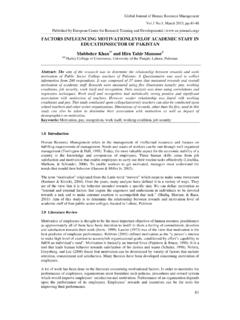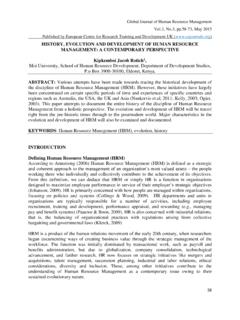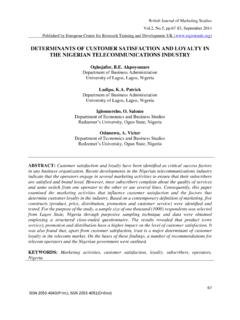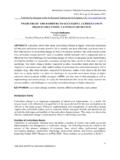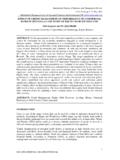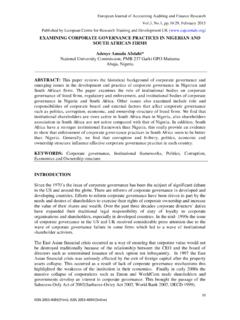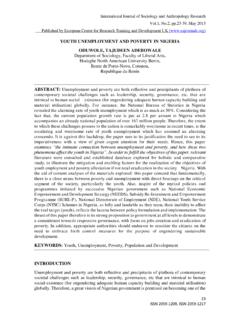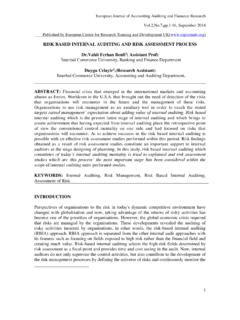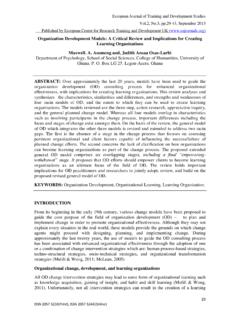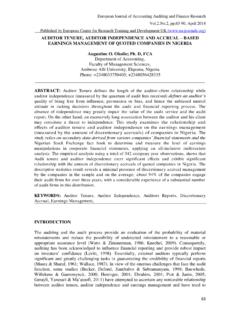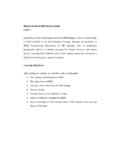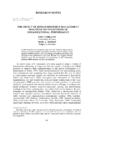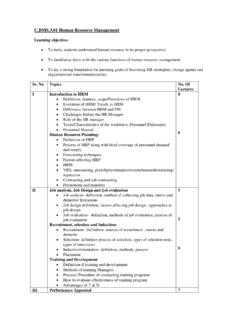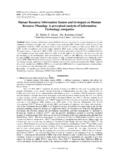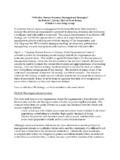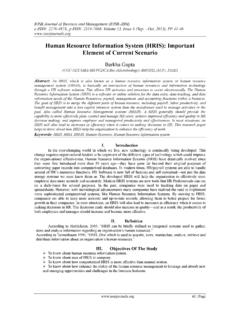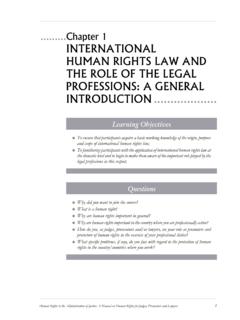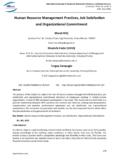Transcription of THE ROLE OF SCHOOL PRINCIPALS AS HUMAN …
1 Global Journal of HUMAN resource Management , , , January 2015 Published by European Centre for Research Training and Development UK ( ) 73 ISSN 2053-5686(Print), ISSN 2053-5694(Online) THE ROLE OF SCHOOL PRINCIPALS AS HUMAN resource MANAGERS IN SECONDARY SCHOOLS IN NANDI COUNTY, KENYA Chemutai Emily Box 4237 - 30100, Eldoret, Kenya ABSTRACT: Across the world, globalization has elevated the importance of HUMAN resource management development in organizations. These changes have led to the notion of the HUMAN resource system as a strategic asset. Many of the arguments about processes of globalization within the HR function rest on the assumption that there has and continues to be longitudinal change in the conduct of HUMAN resource . In order to effectively deal with all these changes, HUMAN resource professionals must develop competencies that will allow them to carry out their roles effectively, such competences like: flexibility, team work, communication, strategic planning, network building, client service, orientation, organizational awareness, self confidence, sharing of expertise, global and cultural understanding among others.
2 This paper sought to identify the role played by SCHOOL PRINCIPALS as HUMAN resource Managers in Secondary schools. The study was modeled on Burns and Stalk Contingency theory which focuses on how management systems might change in response to demands of rapidly changing environment. Survey research design was used. The target population was 140 secondary SCHOOL PRINCIPALS drawn from Nandi County. Census sampling was used to select the study sample. Data collection was done using self-administered questionnaire. Coding of responses was done using Statistical Package for Social Scientists (SPSS) for windows Version 16. Analysis of the data was done through descriptive statistics. Data was presented in form of frequency tables and charts. The study findings clearly indicated that the primary roles identified included recruitment of staff in schools, encouraging team work among staff, empowering staff and encouraging them in developing their career.
3 Therefore the PRINCIPALS should have a knowhow on, how to carry out the above roles to boost the performance and development of the institution. KEYWORDS: Role, PRINCIPALS , HUMAN resource Managers (HRMs), Secondary Schools. INTRODUCTION The role of the SCHOOL principal SCHOOL PRINCIPALS generally have a responsibility in four areas that include: SCHOOL Management. This includes ordering supplies, ensuring that teachers are hired and assigned, information gathering and basic record keeping. In many Schools, it is viewed as the chief set of responsibilities. External Communications. Completing reports required by the central ministry is a major task for PRINCIPALS in some countries. For instance, until only a few years ago, PRINCIPALS in Nepal had to complete a 52-page form for the SCHOOL Administration Section of MoE and a four-page Global Journal of HUMAN resource Management , , , January 2015 Published by European Centre for Research Training and Development UK ( ) 74 ISSN 2053-5686(Print), ISSN 2053-5694(Online) survey, collecting much the same information, for the Manpower and Statistics Section of the same Ministry, (Chapman & Dunghana, 1991).
4 In another SCHOOL , PRINCIPALS until recently were required to complete a 46-page survey about their schools three times a year. PRINCIPALS also share responsibility with district education officers for ensuring that ministry policies and programs are conveyed to teachers and parents. SCHOOL -Community Relations. The demands of SCHOOL -community relations involve working with community councils, community development associations, parent-teacher associations, and other local organizations that have an interest in the schools (Cody, 1998). The goal for such relations is to encourage community support for the SCHOOL , for teacher subsidies, facilities construction, and maintenance or for the schooling process encouraging parents to ensure that their children do homework, send their children to SCHOOL . Instructional Supervision. The extent to which SCHOOL -level administrators regard instructional supervision as part of their responsibility varies across countries.
5 However, one common by-product of decentralization is an increased expectation that principal rather than inspectors will play this role. This shift toward PRINCIPALS taking more responsibility for instructional supervision which has major implications on how they are trained, (Chapman & Dunghana, 1991). For many years, all across the Latin America and Caribbean (LAC) region, schools have been dismissed as little more than a collection of classrooms, one SCHOOL interchangeable with another, the smallest units in a powerful, centralized education system. SCHOOL PRINCIPALS , traditionally mid- level managers, acted strictly as transmitters of orders and rules. With minimal authority, low prestige, and inconsistent support from the SCHOOL community and the education system at large, they were overlooked as potential leaders and facilitators of change (Moura, 2000).
6 Over the past decade, there has been a shift in how schools are viewed by education policy makers and researchers; but perhaps more importantly teachers, parents, PRINCIPALS , and indeed the general public are reconsidering the purpose and goals of schools. National and international conversations about education reform suggest a need for schools to be more autonomous, more responsive to the demands and concerns of multiple stakeholders, especially at the local level (Alvairo, Arzola, Brunner, Recart & Vizcarra, 2000; Pozner, 2000; Sallan, 1998). In part, the role of the principal is to ensure the efficient and transparent administration of the SCHOOL . Many of the day-to-day management issues are very practical, but of critical importance. In many areas, working to reduce teacher absenteeism is a major priority (Halliday, 1999, Condy, 1998).
7 Secondary SCHOOL PRINCIPALS may also face a series of financial pressures. In Kenya, SCHOOL PRINCIPALS ranked SCHOOL fees and money matters as their principle concerns (Kitavi & Westhuizen, 1997). Some other very specific challenges include the incidence of sexual and physical abuse of girl students by teachers. SCHOOL heads have a particular role to play by working to change the culture of violence and complacency and establish a more caring, participatory, and democratic SCHOOL environment (Leach et al. 2000). Schools are also increasingly expected to develop links with local communities. Parental involvement may be seen as a mechanism to increase attendance, a means of raising additional Global Journal of HUMAN resource Management , , , January 2015 Published by European Centre for Research Training and Development UK ( ) 75 ISSN 2053-5686(Print), ISSN 2053-5694(Online) income, or as a means of creating accountability for SCHOOL management.
8 Developing good community relations is an additional burden on SCHOOL leaders, particularly as the community may have no idea of what is needed in teaching and rely on the principal to explain the issues to them (Condy, 1998). While SCHOOL PRINCIPALS may focus on the administrative roles (Kogoe, 1986), there is strong evidence that they play an important part in ensuring instructional quality (Togneri 2003). In the absence of other inspection and supervision structures, the responsibility for guiding and supporting new and often poorly trained teachers may fall to the SCHOOL principal (de Grauwe, 2001). Helping teachers to develop the quality of their teaching is a difficult and lengthy process, particularly where the teachers have low levels of education (Condy, 1998). With the growing importance of SCHOOL -based in-service programs, it is important that the supervision be focused on providing guidance, improving performance, and enhancing professionalism and morale, rather than simply on criticism of teachers (Craig, 1999).
9 It was argued by (Lumby, 2003) that teacher motivation has been affected by the multiple education changes and by the wretched physical conditions in many schools. He adds that, if motivation and morale are low, then teaching and learning suffer. Therefore motivation and morale are the main factors to performance in teaching and learning. The PRINCIPALS have not realized that they are HUMAN resource managers therefore they are not even aware of the HUMAN resource (HR) roles like motivation (Lumby, 2003). It is the function of the managers to make sure that by all means the morale of the teachers is uplifted so as to enable the work to be carried out with a lot of interest which in turn will boost the performance of different individuals in their different tasks. The PRINCIPALS have not been delegated fully to the responsibilities of HR managers.
10 You will find that the motivation of teachers will need involvement of several people after a certain performance. The principle cannot decide on his/her own on what to do on a certain performance because the board of governors (BOG) has to be involved. This becomes big challenge because the process of motivation will take long and it will lose meaning. Therefore the PRINCIPALS should be given the mandate of performing some HR manager roles without interference for it to have meaning. It is the motivation of the workers which will make the working condition to be conducive thus boosting the morale. With few exceptions, instructional supervision is the function least well served by the typical allocation of responsibilities across the administrative structure of the education ministry. Teacher supervision in most Schools is the responsibility of officials operating from the provincial or (more often) district level.
